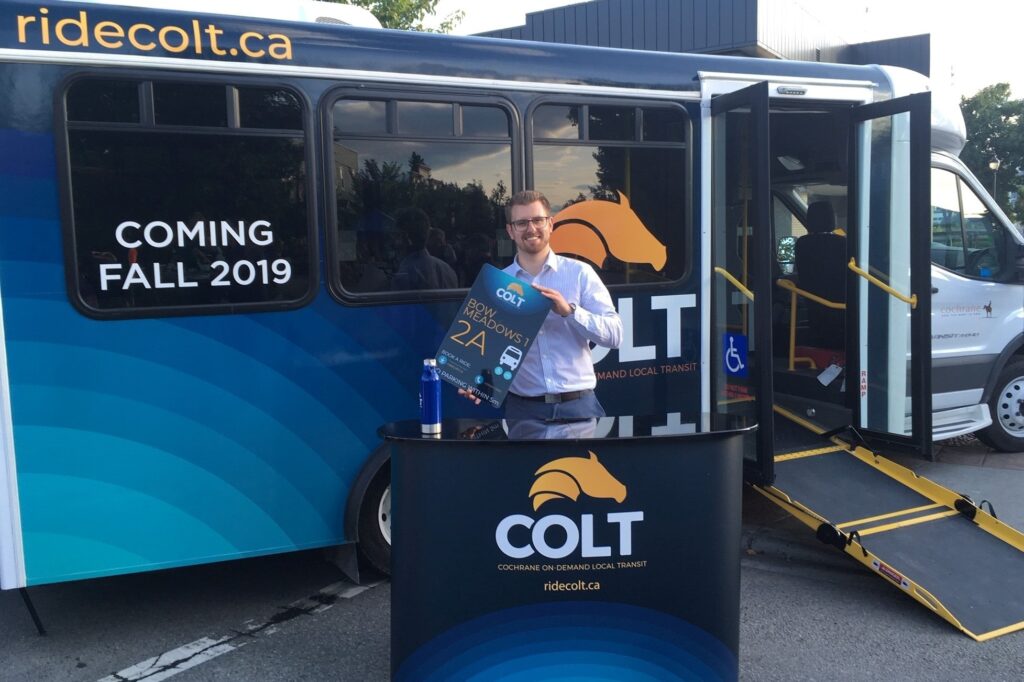The Town of Cochrane and the City of St. Albert are increasing efficiencies and reducing costs through the Municipal Energy Manager program. One year ago, both municipalities hired energy managers to develop energy management plans, find energy-saving opportunities, and lead energy reduction projects.
After their first year on the job, these energy managers are achieving exceptional results, proving that their decision to invest in this position was a wise choice. The best part is, the Municipal Climate Change Action Centre covered up to 80 per cent of their salaries and supports them every step of the way.
The City of St. Albert and the Town of Cochrane hired two of the eleven (and counting!) municipal energy managers a year ago, and these are their experiences so far.
City of St. Albert
Environmental stewardship is a priority for the City of St. Albert, so the Municipal Energy Manager program was a natural fit. The City of St. Albert had already done great work towards greenhouse gas (GHG) reductions, such as having Canada’s first municipally-owned long-range electric buses powered in part by a solar PV system. The City has also actively pursued projects identified in past energy and water audits. However, much of this work has been done off the corner of someone’s desk. By participating in the Municipal Energy Manager program to create Cassie’s position, the City secured a dedicated staff member to help them pursue further cost and GHG savings and make progress on their environmental stewardship and fiscal responsibility goals.
Looking Back on Year 1
Cassie started her role with the City of St. Albert as their Municipal Energy Specialist in December 2019. While her role is structured within the Environment branch, she works with staff across many departments, including Public Works and Transit, Recreation and Parks, Finance, Strategic Services, and Engineering. The City is excited to have support in pursuing ways to reduce its energy consumption, costs, and GHGs.
While her education and training are in energy management and clean energy, she had not previously helped an organization formalize or develop an energy management program. Fortunately, the support provided through the program is not limited to the financial contribution.
More than funding
The Action Centre supports energy managers with monthly action items, tools, and training opportunities to help guide their progress.
Cassie’s first year began with collecting utility data and building information to complete a benchmarking study. The study compared the City’s building energy consumption to that of similar buildings in similar climate zones. This helped the City to understand how its buildings are performing and to identify where the most opportunities are. It also helped the municipality establish a GHG inventory baseline and to set goals for GHG reductions.
The Action Centre also offers strategic energy management sessions on topics like boiler optimization and compressed air management. These sessions are open to facility staff as well, which is another great way to build internal capacity around energy management.
The program also includes several training and learning opportunities, including developing successful employee engagement programs and undertaking energy modeling in RETScreen. RETScreen is a clean energy analysis software program for which the Action Centre provides a license to the municipality.
Finding opportunities
Cassie worked with her Executive Sponsor and facility managers to form an Energy Management Team and develop a charter outlining the City’s work. From here they began to undertake energy scans of facilities, where she worked collaboratively with facility managers and operators to identify energy saving opportunities, which are later analyzed and prioritized into an energy management plan. This work is complemented by energy modeling to help understand the drivers of the facilities’ energy consumption, and to help capture the savings seen over time as measures are implemented.
Cassie completed an energy management assessment of the City’s organizational approach to energy management with the help of the Action Centre. This assessment identified opportunities and actions to help mature their energy management system across a Plan-Do-Check-Act framework. The City has completed many of these actions and, are now seeing the benefits of a more developed approach to energy management.

Grant funding and projects
In addition to identifying and implementing low- and no-cost measures through energy scans, Cassie has accessed several different grant funding programs in support of the City’s projects. Municipal budgets are tighter than ever due to the financial impacts of the pandemic, so being able to access grant funding can be a pivotal consideration in deciding whether a project can proceed.
Grant funding and projects that are underway or planned includes:
- In 2020, with funding support from the Alberta Municipal Solar Program, the City completed the design and construction of a 287 kW DC rooftop solar PV array at the public works facility. They are also exploring the installation of a large solar PV array on the recreation centre, which would more than double the City of St. Albert’s solar power capacity.
- The City is installing a REALice floodwater de-aeration water treatment system to enable cold water flooding for two of the arenas at the City’s recreation centre and is excited to see the savings once the arenas reopen. The City is also planning a large LED lighting retrofit at the centre later this year that will help achieve significant energy and demand cost savings, as well as the associated GHG reductions. Both projects are funded in part by the Recreation Energy Conservation program.
- The City is planning to undertake a feasibility study to assess moving more fleet vehicles to electric later this year. This study and possible purchase of vehicles will be funded in part by the Electric Vehicles for Municipalities program.
- The City has undertaken its first building recommissioning project, at Maloney Place. This commissioning demonstration project was made possible by a financial contribution from Natural Resources Canada and is expected to result in a case study which can inform future decisions. All staff involved are excited for the potential of recommissioning City facilities, not just for the energy reductions, but also the operation and maintenance savings associated with the improvements.
Additional activities
In addition to the activities outlined above, through Year 1 Cassie also had the opportunity to:
- Undertake billing structure analysis and modelling, to be able to better estimate cost savings associated with measures.
- Explore the recreation centre’s electricity demand with the facility manager to better understand what is driving the peaks and how it might be managed differently.
- Initiate a review with the city’s electricity distributor to have one of the demand billing determinants revised to reflect actual usage and reduce utility costs.
- Communicate the city’s successes to staff and leadership to raise the profile of energy management.
There are several other grant funding programs that are on the City of St. Albert’s radar for other potential projects.
COVID-19 pandemic impacts
Like most municipalities, when the COVID-19 pandemic began in March 2020, the City’s focus had to shift. City emergency operations were activated, and many staff had their day-to-day work put on hold, but Cassie was able to continue working on the energy management portfolio. Understandably, other staff did not have much capacity to support these activities; however, Cassie was able to shift her attention to more independent work.
As the City was closing and reopening buildings in response to restrictions, Cassie was able to monitor and analyze utility impacts and bills to help understand financial impacts and predict future bills. She also contributed to an analysis of different operating methods for facilities to help inform operational decisions associated with changing provincial restrictions.
Also like most municipalities, there have been significant financial impacts of the pandemic for the City, which makes every opportunity for savings identified through energy management more important. Modelling information also helped in the decision-making process regarding budgeting and facility operations.
Looking ahead to year 2
There are already many exciting activities underway in Year 2, such as continuing to build on the work completed in Year 1 and expanding energy scans to additional City facilities to identify further opportunities.
As mentioned earlier, Cassie is looking at their municipal fleet and equipment, which produce about 20 per cent of the City’s corporate GHG emissions. A feasibility study through the Action Centre’s Electric Vehicles for Municipalities program will help to inform decisions that will allow the City to take advantage of electric vehicle rebates, as well as other rebates currently in place.
Energy management team
Cassie is also starting the employee engagement campaign, which is an important piece of the program. With 750 City staff spread across over 20 work sites, Cassie knew that she had to find a way to broaden her reach and engage as many staff as possible to achieve the greatest success in the City’s programming. A foundational piece of her employee engagement efforts was the creation of and recruitment for the Energy Team.
The Energy Team consists of 12 Energy Champion volunteers from seven departments, who are creating energy efficiency awareness amongst staff. By advising on proposed engagement campaigns and helping with program implementation in their respective work areas, the volunteers will help ensure the City’s employee engagement is as successful as possible. Volunteers will also gain energy management knowledge and experience through their involvement in the Energy Team, building their internal capacity and achieving even greater savings. Throughout Year 2, Cassie will be meeting with the Energy Team every two months to discuss initiatives which include a space heater swap campaign and lunch-and-learn info sessions for interested staff.
Town of Cochrane
The Town of Cochrane is creating energy savings and fostering a culture of efficiency through participation in the Municipal Energy Manager program. The program removed major cost and knowledge barriers by offering two years of salary funding (up to 80 per cent), ongoing consultant support, as well as networking opportunities with other energy managers across Alberta. The Town of Cochrane hired Devin LaFleche, as their Special Projects Planner through the Municipal Energy Manager program.

Tip: Municipalities can choose a position title consistent with their structure when they hire someone through the Municipal Energy Manager program.
The program has helped the Town better understand and track our energy use, set ambitious energy savings goals, and implement projects to meet these goals. The Town of Cochrane views the program as an essential step towards creating a culture of energy efficiency and achieving the vision for the future of Cochrane “as a pioneer of sustainability”.
Implementing energy and cost-saving projects
Since joining the program in January 2020, Devin has already implemented energy conservation measures that will result in an estimated annual energy savings of $80,344 and an annual GHG emissions reduction of 380 tonnes. These savings were achieved through the program’s initial focus on identifying and implementing low-cost/no-cost measures.
Two notable projects from Devin’s first year include:
- window replacements at the Town Administration building, and
- LED lighting upgrades across the Town’s administration, operations, and recreation facilities.
Devin applied to receive funding for the LED lighting upgrades through the Recreation Energy Conservation program. This program covers up to 75 per cent of the cost of the lighting project at recreation facilities. This funding reduced Cochrane’s payback period for LED lighting at recreation facilities down to one year. Furthermore, Cochrane plans to conduct a scoping audit through the Recreation Energy Conservation program to identify and implement additional energy savings.
Educating staff and the community
In addition to facility retrofits, Devin has created a robust education and engagement program within the Town’s Administration, and there are plans to expand to external community stakeholders in year two of the program.
In their first year, a key engagement project was the creation of the Consumption Reduction Team, a group open to all Town staff with a passion for finding efficiency. The Consumption Reduction Team allows for cross collaboration throughout the organization with staff from a range of administrative departments. By bringing staff together from different areas of the organization, Devin is creating a holistic awareness and dialog around efficiency. The Consumption Reduction Team is exploring several exciting projects that include:
- Staff and community engagement campaign (video series)
- Paperless and ongoing process improvement
- E-signatures, e-payments, and e-submission portals
- Facility retrofit projects (e.g. LED lighting across all Town facilities)
- Space heater replacement program
- Community buck-a-bulb LED lighting exchange program
- Lobbying for reductions in street/traffic light delivery costs (10% savings = ~$96,000)

Support from Council and staff
The Municipal Energy Manager program requires executive support within the organization. This has allowed Devin to work on strategic and large-scale projects. As a result, he is working to implement a local and regional transit service integration into Calgary, which is estimated to reduce commuter GHG emissions by 1,265 tonnes CO2 per year.
In addition, Devin is leading a grant application for a 2.5MW ground mounted solar farm project through a public-private partnership with a large local industrial emitter. The project is expected to reduce emissions by 2,547 tonnes of CO2 per year, and contribute an estimated $250,000 per year to the community benefit fund.
Support for Energy Managers
The COVID-19 pandemic had a major impact on the Town of Cochrane and forced the administration to find ways to save on operating costs. Devin has capitalized on this need by providing the Town’s Leadership with low-cost and no-cost projects that achieve savings, improve comfort, and empower staff to take action.
The program offers the support and flexibility to create significant savings and real changes within communities. Participation in the program has helped the City of St. Albert and Town of Cochrane build internal capacity for energy management that will provide savings for years to come.
A great opportunity
The City of St. Albert and Town of Cochrane are realizing how their municipal energy managers improve their municipal building’s energy management, find energy-saving opportunities, and lead energy reduction projects. After seeing the results achieved throughout the first year, they are excited to start the second year of the program.
Considering that the Action Centre can help fund up to 80 per cent of your energy manager’s salary for two years, the return on investment for a municipality is difficult to debate.
Hire a Municipal Energy Manager before April 30, 2021, to lock in two-years of funding. Municipalities can still apply for the program after this date but will only be eligible for one year of funding and support.
Cassie Kupsch’s biography
As the City of St. Albert’s Municipal Energy Specialist, Cassie Kupsch supports renewable energy and energy efficiency-related projects to advance the City’s GHG reduction goals and realize cost savings for the City. Cassie holds an M.Eng. in Clean Energy Engineering from the University of British Columbia and is registered with the Association of Energy Engineers as an Energy Manager In-Training.
Devin LaFleche’s biography
Devin LaFleche graduated from McGill’s Master of Urban Planning program in 2018. His research at McGill, in collaboration with the City of Calgary, focused on quality outcome management in the planning process. As the Sustainability & Transit Coordinator, Devin oversees the operation and management of the Town’s renewable energy and energy efficiency projects. His new sustainability role has led to the implementation of significant consumption reduction measures across the organization, creating real savings and progressive change for the Town of Cochrane.
Author: Torrie Santucci, Project Coordinator, Energy Efficiency


You must be logged in to post a comment.